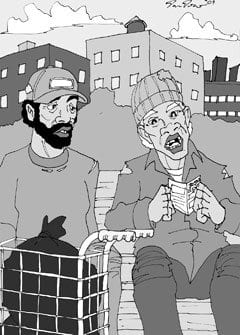
Back to basics
The well-publicized financial difficulties of The Boston Globe have caused thoughtful people to consider what the city would be like without a major daily newspaper. Unfortunately, there are still too many who do not give the issue much thought.
Historically, the press has chided society and its prominent members, and the people, in turn, have criticized the press. That relationship has been a significant part of Western civilization for centuries. Edmund Burke, the conservative 18th century philosopher and member of the British Parliament, reportedly first dubbed the press the “Fourth Estate.”
The French had divided society into three estates: the clergy, the nobles and the commoners. In his 1841 book, “On Heroes and Hero Worship,” author Thomas Carlyle wrote, “Burke said there were Three Estates in Parliament; but, in the Reporters’ Gallery yonder, there sat a Fourth Estate more important far than they all.” Since then, the term has stuck to define the role and responsibilities of the press.
Before the invention of radio, television and the Internet, the press was limited to publishers of newspapers, magazines and broadsides. As American society and government became more complex over the years, the scope of newspaper coverage became much broader and the Fourth Estate became an integral element of American democracy. The major daily newspapers have assumed the primary responsibility for investigating the labyrinthine corridors of political power to ensure that state and federal government are operating efficiently and honestly.
In the past, the revenue from advertising was sufficient to finance such investigative reporting. But now, competing media have caused such a decline in newspaper advertising that some dailies have been forced to close and others have had to curtail their operations. During this crisis, too little attention has been given to the dailies’ primary role as governmental watchdog.
One reason for this is that public education seems to stint on civics. It is shocking how few Americans know how their government works. Unfortunately, when newspapers publish information about political irregularities, the result too often is for people to become discouraged by the malfeasance rather than committed to stay better informed.
According to circulation data, many dailies have suffered a decline in readership in recent years. Some of this is to be expected, because competing media are able to deliver breaking news faster. Dailies then have the unavoidable responsibility of reporting news that might be a bit stale by the time it gets on the newsstand. The only way to resolve that problem is for reporters to find unique angles.
One problem that editors can correct is the undue reliance on press releases. Papers must have an absolute commitment to print the truth. The statement of a reliable source is often inadequate if it somehow does not ring true. The public must believe in the veracity of the press.
Despite some assertions to the contrary, neither television nor Web sites will ever do the kind of investigative journalism common to newspapers that is so essential to the integrity of the democratic process. One reason is that newspapers provide the best medium for publishing the results. After the newspaper journalists do the work, the cameras can come in to produce an engaging TV special.
Sen. John F. Kerry, D-Mass., chairman of a Senate Commerce subcommittee, has been holding hearings on the problem. The vibrancy of American democracy will depend on finding the right solution.


![Banner [Virtual] Art Gallery](https://baystatebanner.com/wp-content/uploads/2024/04/Cagen-Luse_Men-at-store-e1713991226112-150x150.jpg)



